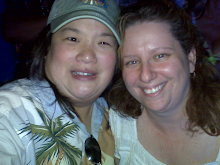Let me start by apologizing for my extreme tardiness in posting this blog. I realize that my actions affect my classmates and for this I am sorry. At this point, I"m going with the theory of better late than never.
Once life slowed down and I was able to get to the blog "conversation" between Bill Kerr (http://billkerr2.blogspot.com/2007/01/isms-as-filter-not-blinker.html) and Karl Kapp (http://karlkapp.blogspot.com/2007/01/out-and-about-discussion-on-educational.html), I found it to be fascinating reading. Kerr's comments felt almost like he was preaching to the choir. I also believe that there is no "one view" of how learning occurs. We've accepted that there are many different learning styles, how then can we say that one theory fits all learning styles? In research, there is always bias. It is inevitable. We put safeguards into research to miminize bias, but there is no way to completely eliminate it. As humans, we will see what we want to see. Statistics are not concrete, so they can be manipulated to "be right." I'm not saying that this is always the case, but it happens. If the numbers don't quite meet our expections, we can change the variance or confidence level to appear to have different results. This is the same with all the "ism". There has to be a balance between them. Kerr said it best when he said " isms are important, but use them as a filter not a blinker." As the future educators we need to embrace this idea and develop educational opportunities that best fit the students' needs not our own.
Sunday, June 28, 2009
Subscribe to:
Post Comments (Atom)

1 comment:
Hello Grace!
I hope you are feeling better. I understand, life happens; and I appreciate your perseverance.
I found the blog conversation interesting reading too. Two points in your post that relate to the _isms and directly affect learning that I think about and analyze in my own teaching are: 1. As humans we see what we want to see; and 2. Develop educational opportunities that meet our students’ needs, not our own. As a teacher now, for 19 years, the greatest challenge I face every day with my students is meeting their individual learning needs. I always try to keep in mind how they view their learning, not how I do; and what instructional tools and strategies will allow my students to reach their full learning potential. Data can be collected from surveys and tests, but sometimes the best way to find this out, is to just ask the students.
Thank you for your post!
LeAnn
Post a Comment